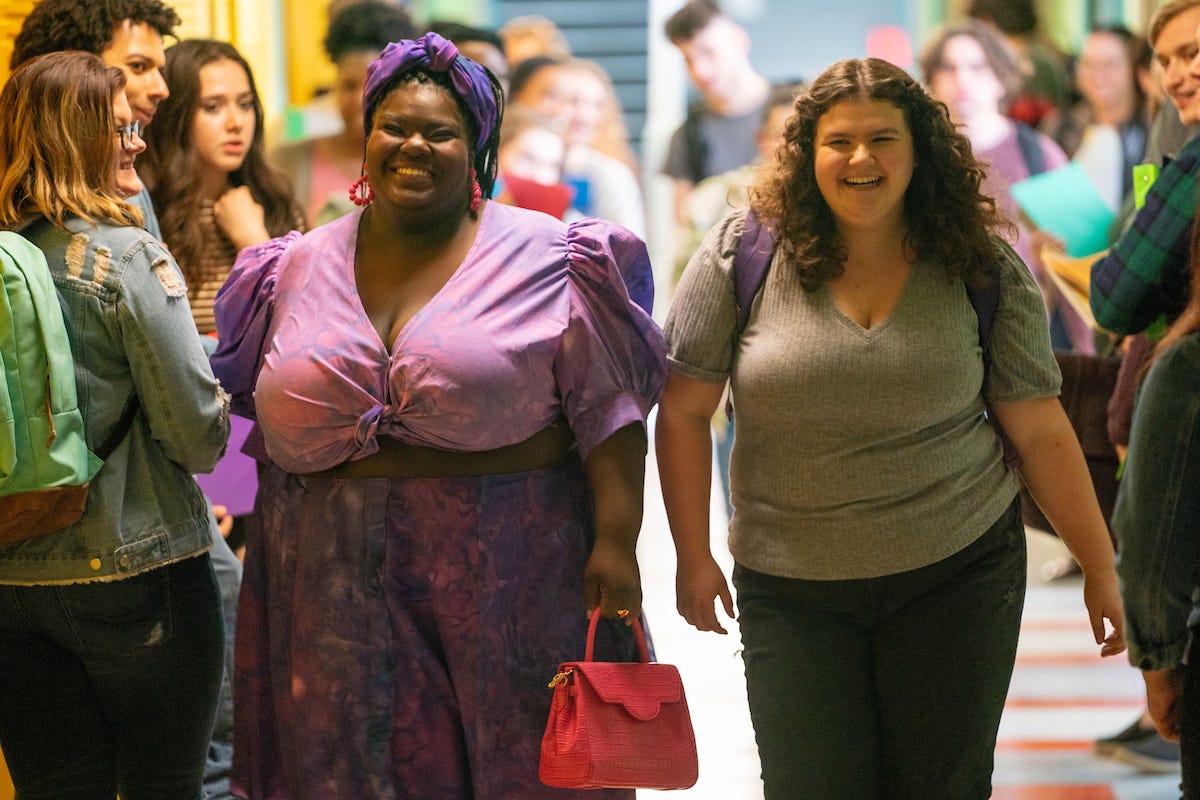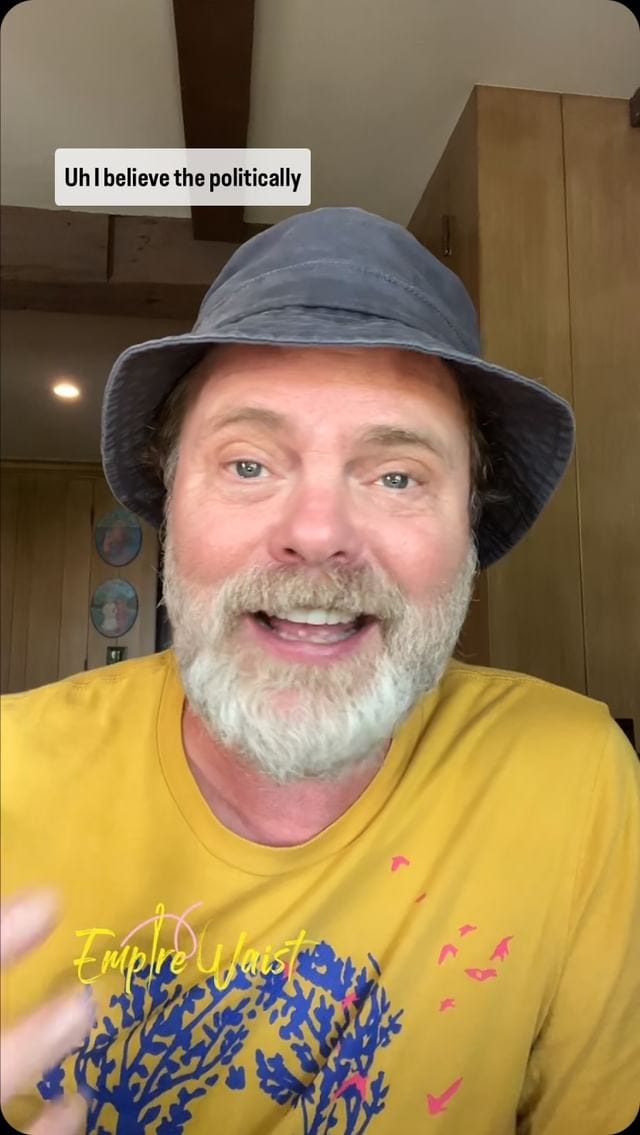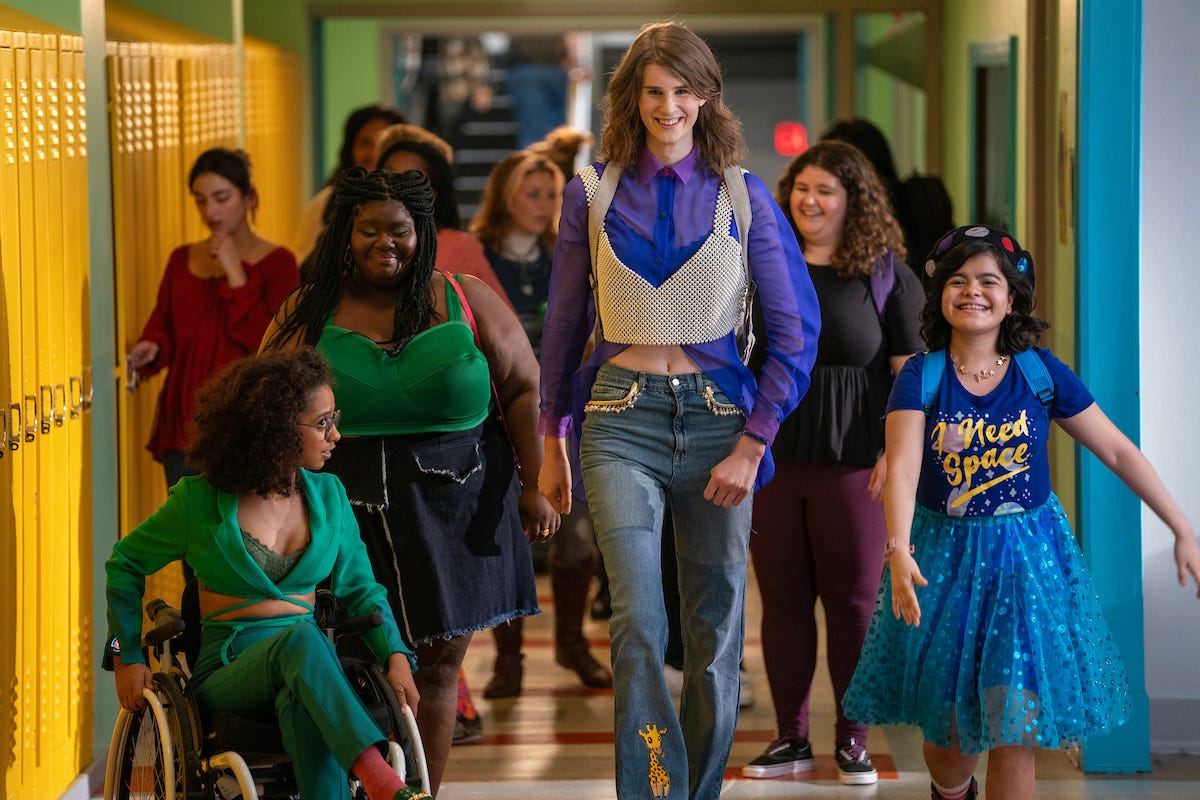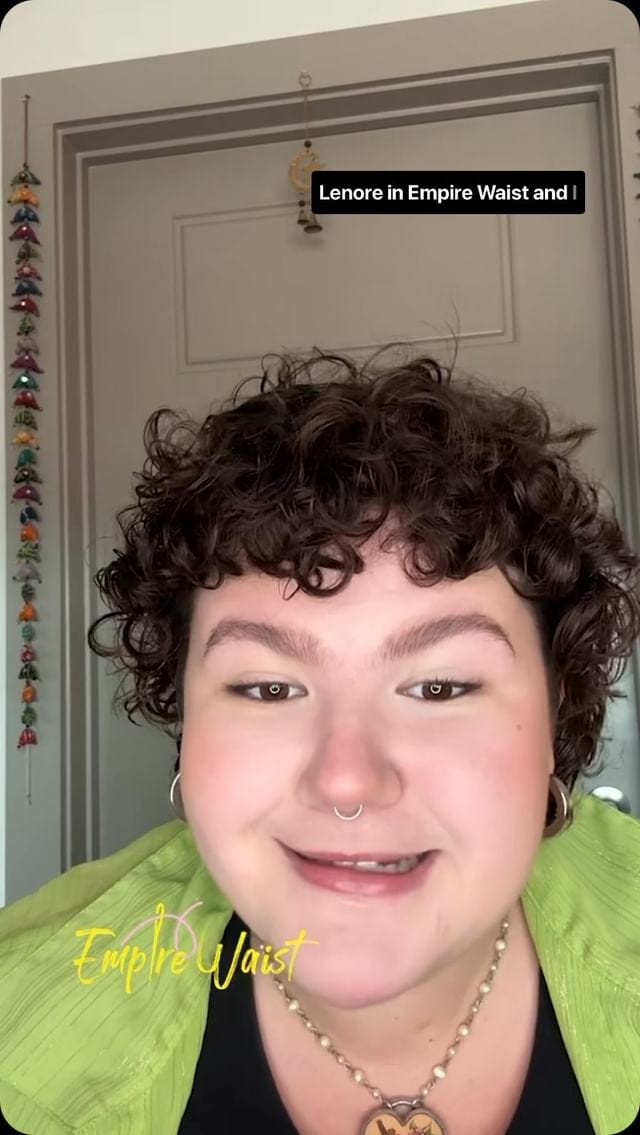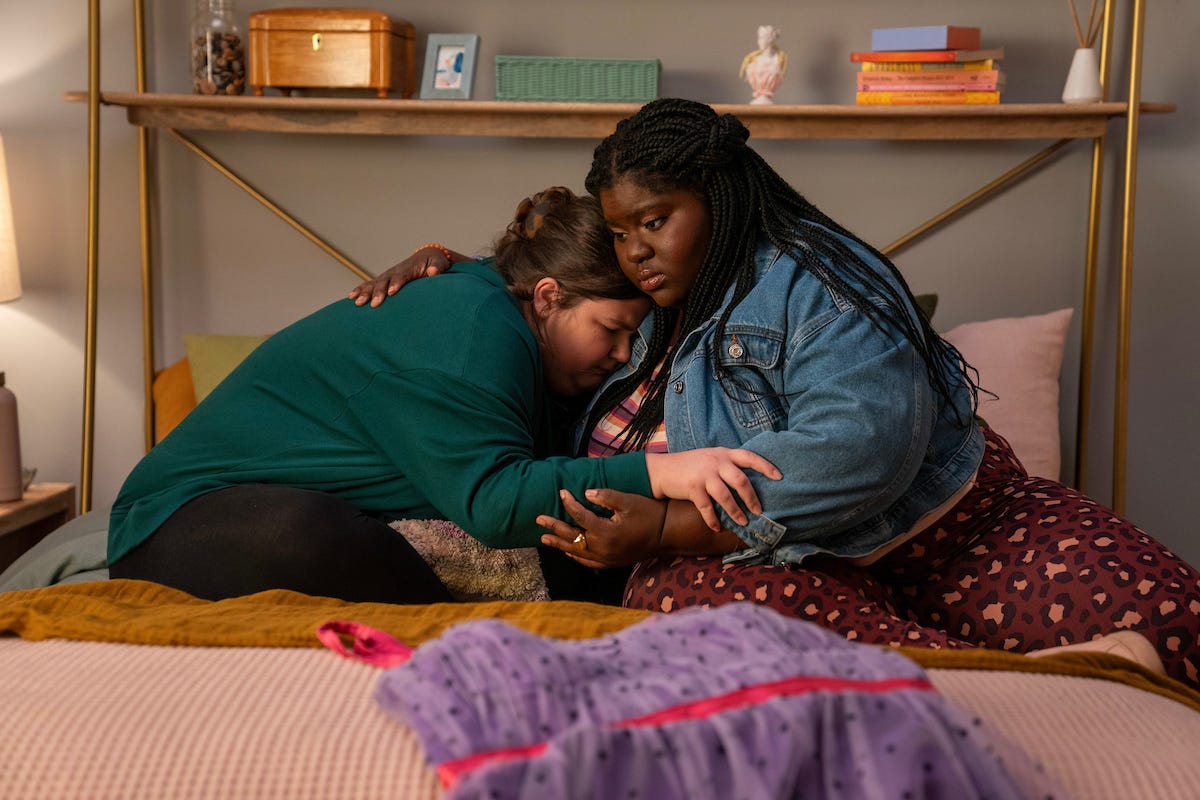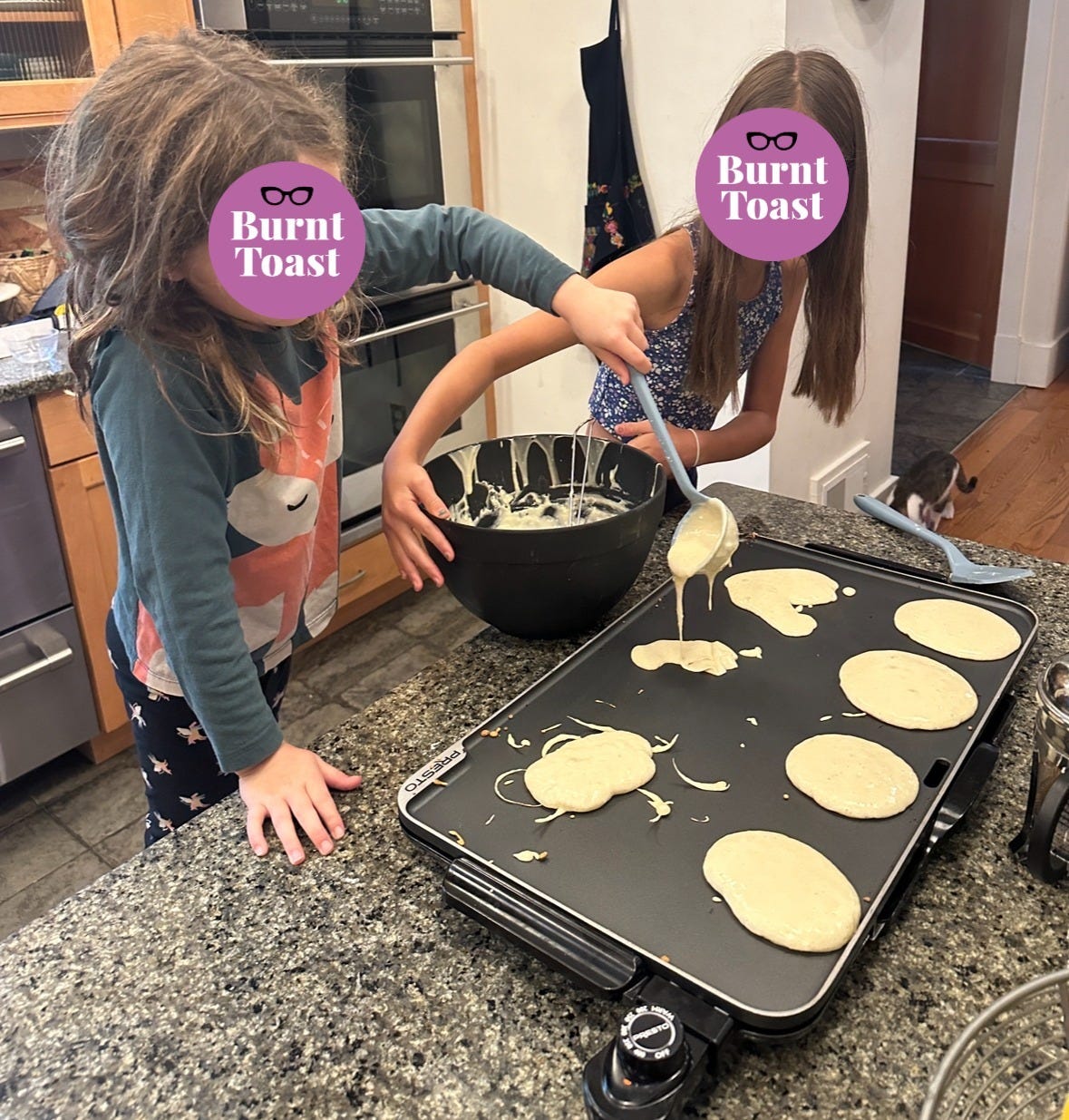How to Make an Unapologetic Fat Film
Manage episode 441936838 series 3363466
You’re listening to Burnt Toast!
I’m Virginia Sole-Smith, and today my guest is Claire Ayoub.
Claire is the writer and director of the brand new feature film—opening tomorrow!!— called Empire Waist, a heartfelt comedy about teens learning to love their bodies through fashion design and friendship.
I saw Empire Waist a couple of days before I interviewed Claire, and I haven’t been this excited about a movie in a very, very long time. It’s a film I can’t wait to show my 11 year old, but I’m also dying for all of you to see it. I think kids and adults are going to feel so so seen by this story.
You’re going to get so much out of my conversation with Claire. But also know this is an independent film. It’s not getting a huge box office release and the more we, as the Burnt Toast community, can do to show up for it, the more distribution it will get—and the more we’ll communicate to Hollywood that we want more stories that center fat experiences and fat joy.
PS. If you enjoy today’s conversation, please tap the heart on this post — likes are one of the biggest drivers of traffic from Substack’s Notes, so that’s a super easy, free way to support the show! And, make sure you’re following us (it’s free!) in your podcast player! We’re on Apple Podcasts, Spotify, Stitcher, and Pocket Casts! And while you’re there, please leave us a rating or review. (We like 5 stars!)
Episode 161 Transcript
Claire
I’m Claire Ayoub. I’m the writer and director of Empire Waist. It is the movie I wish I had as a teen, and honestly as an adult. As a person with a body.
I wrote a piece for Amy Poehler’s Smart Girls in 2015 called Take The Plunge. It was a note to my 12 year old self, and I wrote about how I quit swimming at 12. I wrote it at 25, because I was getting back back in the pool.
For me, that was really important to write to my younger self to say, “You’re about to quit something that is your favorite thing in the world because you can’t handle making that walk from the locker room to the pool.” A 20-foot walk to my favorite thing, and I couldn’t handle it because of the shame I felt about my bigger body and my changing body.
During puberty, our bodies change—and that’s normal. But I felt so ashamed! So I wrote this piece—and I was so terrified to write it—but the response to it is why I wrote this movie. Hundreds of people, especially women, across the US and around the world, were responding about the things they quit at that age. I wish we had had something that we could have seen to make us feel more seen and less alone, that we’re not alone in this struggle. And so that’s why I wrote the movie.
I basically had the idea of, what if you could wear whatever you wanted, that what was available wasn’t the obstacle, but you still didn’t feel worthy to wear it.
We see a character who is so talented and has a passion for fashion design, but she’s bullied at school. She keeps her head down. She keeps it to herself, and she doesn’t wear any of her designs because she doesn’t feel worthy to. It’s not until her clothes get discovered by her fat classmate at school who’s confident—she has that confidence and loves color and patterns, but can’t find the clothes she wants to wear that really resonate with her. So she begs her to make her one dress. And what starts there is a friendship love story. Because the movies I saw about body image were all really sad. You know, seeing people binge or seeing people be sad and bullied.
Virginia
The Calista Flockhart eating disorder special that we all grew up with.
Claire
I wanted to show what helped me get through it, and always helps me get through it, which is friendship. No matter what our body type, our friends see us at our most powerful. Just because a character is super confident, like in the case of Kayla who plays her best friend, that does not mean she is a two dimensional character who’s just figured it out, you know? That was why it was really important for me to direct and to see this through from beginning to end. Because it was a very commercial script. I had offers to buy the script through The Black List. But I knew if I handed this over, it could have just been smoothed out.
Virginia
There were so many moments as I was watching it, where I thought, oh, she avoided that. You avoided so many moments where I felt like it could have gone in a Disney, a cliched afterschool special way, but also in a way that would have been so much more apologetic of fatness.
I just want to say for folks, I got to see a screener a few days ago. I mean, I cried multiple times watching it. I also laughed a ton. It is an incredibly joyful, hopeful movie, with some tough stuff, of course. And I just kept thinking: There is no apology for fatness here.
Claire
It’s really important to meet your audience early and often, because Hollywood doesn’t think we’re worth the risk. Because they don’t see it as a story that resonates, a story that will drive box office. Because it’s always about dollars.
So I always talk about finding your audience. Prove that there is an audience on the business side, but also craft-wise. Talking to people, testing the script with them, and getting their actual feedback. Because we only have our one life experience.
This is a very diverse cast, and I am a white gay woman. But being gay doesn’t mean I get to talk about everything else in the world, you know? I’m a cisgendered woman, I’m an able-bodied woman—so looking at that, I really wanted to ensure as a way to take care of the story, and also make sure people saw themselves represented.
So I did 17 live readings across the country in 2019 and early 2020. And that’s not that’s not normal, that is not normally part of the process. I was like, “I’m doing a script tour!” Everyone’s like, “what’s a script tour?” I’m like, “Just go with it.” And I really gave permission to the audience, both in person and afterwards in Google Forms to say what was working and what confused them and what could be done better. Especially when it came to the diversity and inclusion of this film. So I learned on this script tour across the country, that the script resonated with people from 14 to 84.
Virginia
Wow, that’s cool.
Claire
I remember a 70 year old woman come up to me after a reading, who had lived a life, right? And she goes, “I can still remember my mom and when I was maybe six or seven, giving me skim milk and my sister whole milk because I was bigger than her.” I had another mom who came up to me in tears going, “Oh my God, I have to call my adult daughter.” She’s in her 60s or 70s. She goes, “I thought I was helping. I thought I was helping when I was saying these things.”
So in the beginning, I talked about this movie being for teen girls — but I stopped doing that early on, because why are we limiting this? We got great feedback, especially from non binary kids and adults saying thank you for not gendering this to make it just a movie about teen girls. Because body image is body image, and that was really important to us. During this whole process, it’s about learning and shifting and adjusting based on what you learn. Because this is what we love about it is people coming up to us after and saying they felt seen.
Virginia
I watched it by myself and the whole time was like, I can’t wait to show my 11 year old. She’s going to love it. But I was also thinking, I can’t wait for Burnt Toast listeners in general to watch because as you’re saying, it really is all ages. It makes the conversation very accessible to kids, which doesn’t always happen. But as a parent, I mean, I connected so hard with her dad. I saw her mom, I know her mom. It is just, it’s really rich and beautifully done.
Claire
I just want to shout out really quick, Missi Pyle, who plays the mom. She is one of the most supportive human beings—especially when it comes to body image. Because those seventeen live readings basically were for me to get this mom’s character right.
Virginia
It’s a hard character!
Claire
It’s a tough character. It would have been so easy for this mom to be a two-dimensional, icy bitch who is just being mean to her daughter. So really walking that fine line that she loves her daughter so much and is so afraid for her to be rejected, to be bullied, that she wraps that kid in love and fear and it hurts, right? Looking at that. And Missi Pyle—she and Rainn Wilson going toe to toe. There’s a big argument scene that had all of us crying behind the scenes. The two of them have been such champions of this movie, and its message. Both of them are parents and just really want to see this story of acceptance and how to support your kids. It’s really looking at your own fears and where it’s coming from.
Virginia
Let’s talk about the cast a little bit. We had Katy Geraghty, who’s an incredible Broadway actor, on the podcast last year. She talked about how, as a fat person playing fat characters, it’s both a huge opportunity for representation, and you’re often reliving some of your own trauma or dealing with a director who is not so sensitive, and it can be really fraught.
So talk a little bit about what you did to protect the cast, because the the actors that play Kayla and Lenore are quite young, right?
Claire
They were. They were 19 years old when we filmed. They were babies. My refrain this whole time was, “I am not going to have you pull up something that happened yesterday. I don’t want you pulling from your own experience. I don’t want you re-traumatizing yourself.”
What was really important to me was understanding how to protect my cast and crew, both physically—we were shooting at the height of covid—and mentally, because this is a story about someone who has deep self loathing for her own body. This is a movie with bullying from a character, a mean girl who has her own struggles with food, right? Her own struggles with control and body image.
I had two people come up to me after that scene with Missi Pyle and Mia Kaplan in the hallway, where the mom really being very clear about her own views of her daughter’s body and how people see her. I had two grown adult men ask if they could give me a hug because they needed a hug, because they had teen daughters, right? So a big part of this was preparing myself with the skill set to support my cast and crew, meaning I tested the script not only with people 14 to 84, but with social workers, psychologists, teachers, educators, healthcare providers. I needed to ensure my cast and crew did not suffer to tell this story.
Virginia
So important.
Claire
I was talking with a social worker at a friend’s birthday. And I mentioned the mean girl character, Sylvie, and how she controls her friends’ food. And the social worker goes, “Whatever you do, do not show what she’s eating.”
Virginia
Yes, I noticed this!
Claire
My brain went, what? Because, as a filmmaker, what would we do? An overhead shot showing four identical meals to convey that. And she goes, whatever you do, do not show what she’s eating. Because someone struggling with an eating disorder will see her, want to look like her, and snap a photo and replicate that. So I relayed it to our props team to say, “Nothing clear. I don’t want to see the food. I only want to see the tops of the food so we know they’re eating something. No direct shots of food. We’re going to shoot across the table to show that they’re sad eating their food, but we’re not going to show what they’re eating.” That is the kind of intentionality that was very important to me.
And with my actors. I created essentially a care plan with them, for my for my actors who played Lenore, Kayla and Sylvie, our bully. We worked together on zoom ahead of time, individually and then together as a group, to parse how the character was feeling, why they were feeling, and also making it super clear that they had each other’s backs in the moment, that this was just a script. So they could trust each other to be there for each other.
So I talked with each of them and said, “What do you need in the moment? What do you need beforehand and what do you need after?” All my actors basically were like, “I need to be left alone leading up to it. I’m probably going to have headphones on listening to music, getting in a headspace for it.” So I relayed that to my my crew to say, hey, hair and makeup, especially costuming: They’re going to be heads down, really getting in them in the moment. Let’s leave them some space and grace to do that.
Then in the moment, it was about making sure that the only people on set were the ones who really needed to be there for certain scenes. But also that our crew had a heads up for really triggering scenes as well.
And then afterwards, my favorite example is Mia Kaplan, who plays Lenore. I was like, “What do you need afterwards to really get shake out that feeling of where you are in the scene?” And they’re a big theater kid and they go, “I want to dance.” And so Mia made a playlist called We Finished the Fucking Scene. And basically my instructions were to wait till the last shot and then burst into the room playing songs from this incredible playlist. So yeah, I scared the bejesus out of Rainn Wilson during a scene where she gets weighed at a doctor’s office. It was the final scene of this long day of terrible scenes for Mia, and I jumped into the room blasting Chaka Khan’s “I’m Every Woman.” And was like, we finished the scene! Poor Rainn was like, Oh my God. Like, what?
Virginia
You mentioned making the decision not to show the food when the character who has disordered eating behaviors. Another thing I noticed you didn’t show was in that scene where she gets weighed at the doctor’s office—we don’t see the number on the scale. I would love to just hear a little more about any other things like that that you were like, “let’s not include that,” or “let’s make sure to show this” in order to talk about these issues, but in a way that’s going to be safe for everyone watching it, too.
Claire
Absolutely. So for the weigh-in scene, I wanted to capture the feeling she had leading up, not just on the scale, but leading up to it, right? I wanted to capture how she felt. And fun fact, movie magic, Mia Kaplan never stepped on that scale.
Virginia
Love that.
Claire
That was our camera operator, Jesse Sanchez Strauss, who stepped on the scale. I didn’t want to show her weight, just like I’d never show Lenore’s own disordered eating. I never show it, and that was done on purpose. We see her taking a bite of pizza. We see her bringing snacks out of her closet. But I did not want someone to be able to freeze frame that and go, “See? See? See? She could have stopped, she could have just not eaten that.” To grab onto that kind of trigger topic and say, see? I was like, no, I want you to see Lenore Miller as a human being. I want you to see Kayla as a human being. I want you to see Daisy Washington, who plays Marcy as the most powerful person in the room.
This is a movie genuinely for everyone. It’s not just for fat people, right? It definitely is to feel seen, but it’s not just for fat people. It is a space to understand and feel empathy towards all bodies.
Like, I never saw The Whale. I had friends flag it to me. They were like, do not. Nope.
Virginia
Marked safe.
Claire
Marked safe. Exactly. And I always look at content like this and say, do we need to se this? Just like something we talk about for trigger content, like rape, things like that in film. Do you need to show it? Do you need to re-trigger people to tell this story?
And just like my original instinct as a filmmaker would be to show the food, thanks to experts, I didn’t do that. Again, how can I make sure I don’t unintentionally harm my audience, my cast and my crew? Super important.
Virginia
It just seems like such a tricky line that you must have to keep revisiting because on the other hand the movie does contain these raw, emotional scenes of the parents fighting about how to handle her or between the mother and daughter. The bullying is really hard to watch.
I was saying to my friend who is planning to watch with her daughter, I think all of that might actually be harder for us as parents to watch. I think kids are just going to be like, “Yup, that’s right. That’s my experience.”
But this happens a lot with my work, too. Parents will say, “I don’t want to talk to my kid about anti-fat bias because I don’t want to tell them they should be worried about their bodies.” And the problem is, kids already know. They’re already seeing it, they’re already experiencing the bullying. So we have to be less afraid of those hard emotions. That’s what they need to see. But they don’t need to see the numbers on the scale. They don’t need to see the specific behaviors. But that’s a very nuanced thing to sort out.
Claire
I love that you write about this in your book, that the fear of becoming fat is so triggering for so many people. I have this with my own mom, who’s one of the most badass people in my life. I love her. I channel her in everything I do. It’s the reason I’ve gotten to this point. But hearing her say things about her body, and I take her by the shoulder, and I go: Mom, I love you. It’s hard to hear you say these things, because I know how powerful you are. I’m never going to tell you what to do. You know, it’s our body, our choice, right? But I’m going to ask and bring up the point of, are you coming from a place of self loathing? Are you coming from a place of beating yourself up and changing yourself from there? Or are you like, I want to be able to run around with my kids, or I have a history of heart disease and I want to make sure that I’m taking care of myself that way. Or is it I don’t count in the body I’m in now, I’m not worthy of love in the body I’m in now. I’m not worthy of this job in the worthy I’m in the body I’m in now.
We have 100 theaters that are on the fence about bringing us in. [Update: At press time there were now 110 theaters confirmed to show the film!] They’re not sure it’s going to resonate with a community, if it’s going to be worthy of an investment. And this is an award winning film. It has been awarded Best Empowerment Film, Best Social Impact Film. I’ve had practitioners saying they want to bring it into their hospitals, medical practices, psychology practices, schools.
But our way of getting to people, getting to audience, getting this curriculum to audiences, is movie theaters and we’re being told, “I don’t know.” I heard that yesterday. I went, all right, to the mattresses, right? Let’s start a campaign. And basically, the way you do it—for your listeners in the future, and especially for filmmakers—you go in person to your local theater and you say, “Are you screening Empire Waist on September 27?”
Virginia
Got that everybody?
Claire
For the future, if you have movies coming out that you are so excited to see that are representative of you, go in in person and say, “Are you screening this?” Because they tick that and send it to a manager who’s booking and so that’s really important. We had over 500 people submit theater request forms before the trailer was even out. People who have been following this journey across the country and around the world. But even then, and since then, even more, we had over a million views of our trailer on Twitter. Thanks to you fat fab feminist, right? Over a million views on one post, of people saying, “oh my God, I’m crying. This is therapy. I feel like this is going to heal something in me,” right? But that’s not communicating to the people doing the booking.
So it’s up to us to take the space in that way. I know it’s enraging, and if there’s anything I’ve learned in this whole process, is to turn that anxiety and rage into action.
Current screening list of Empire Waist!
Virginia
Yeah, absolutely.
Okay, I want you to talk to us about the curriculum, and then I also want you to tell us how can we see the film? Let’s go through both of those things.
Claire
So our curriculum is was sponsored by Procter & Gamble and Gillette Venus. We basically got a quarter million dollars in funding from them to create a fully free, vetted education curriculum. It is seven videos, 15 downloadable activities, all available on our website starting tomorrow.
The mission was to answer the question I kept getting asked after every live reading, which was: What do I do next? So instead of having people feel all these feelings who maybe don’t have access to therapy or don’t have access to a safe space to process, right, it’s a lot to pull out. I was like, what if we could send them somewhere that would have vetted material?
I was also scared they were gonna go down a wormhole with untrustworthy influencers being like, well, this person’s really confident and she’s also doing intermittent fasting, but she seems really cool about it, right? So looking at that, we basically are driving people directly to their curriculum. And it features interviews with our actors, interviews with healthcare providers. And I basically emcee the whole thing. And it covers seven topics from our movie.
We basically go point by point, section by section, one video and two to three activities per that. People could watch the video, hear from our actors, hear from our experts, and then do two to three activities to go deeper.
Virginia
Love it.
Claire
Really it’s a space for our audience, tweens, teens, adults, whether you’re a caregiver or not, or even for adults to talk to each other and de-stigmatize conversations about body image, a space for you to start your own healing journey, your own exploration.
And I actually hired my old boss, who I used to write curriculums for. She has 30 years of social emotional learning expertise. And I also brought in an amazing therapist and social worker who also served as our DEI expert. She’s Chicana. She especially works with queer youth and LGBTQ+ youth and kids of color to specifically vet everything to make sure it was as accessible and inclusive as possible.
So in our section on bullying, for example, we had something in there about, like, “give your kid a mental health day, let them stay home.” And Noemi Maciel pointed out most parents can’t afford that, right? To take that time off work. And so instead of making a parent or caregiver feel bad about not being able to provide that, we just struck it from an option.
So we’re sponsored by PNG, Gillette Venus, and they were like, “We’d love to have a shaving scene in the movie.” And to be honest, they were very great partners, across the board. I love working with them. And I brought up immediately, “look, I want to make sure we don’t tell people that they have to shave their legs in order to be beautiful or to love themselves.” And they were so on board. Of course not. And so in the movie, you see one character shaving as they’re getting ready for this big event, and it pans to the next person with hairy legs who gives a thumbs up and pans away. And in our curriculum, we have actors talk about body hair and talk about some of them love shaving and like the feeling of that on their skin, and they love it as self care. And then others were like, I love my like, natural eyebrows. Cassandra Tellez, who plays Diamond who didn’t shave her legs in that scene.
When I tell you, I texted the cast to be like, “Hey, who wants to stop shaving their legs” And everyone goes, me! And I was like, okay, just one of you. Also, Mia, it can’t be you, you are in every scene. Give yourself a break. And Cassandra talks about it really beautifully, about how she had always been very self conscious of her body hair because it’s darker. She’s Chicana, darker hair, and she’d always felt super self-conscious about it. And she talks about it in our curriculum. And she talked about it with me. She goes, “I stopped shaving my legs since then and I feel confident.”
This is what I love about this project, and I’m so excited for audiences, not just to hear from me, but to hear from our cast, just in how working on this project really forced them to confront a lot of their own held beliefs about their bodies and their limitations.
Someone posted a really awful video, like a troll video, basically. And I watched 30 seconds of it, and I went, “absolutely not.” And it took me a full day to process before I could talk to anyone about it, because I had just done a video about, like, “we can’t control other people’s self loathing. We can’t let that stop our joy.” And then I was like, well, am I challenged by that?
Virginia
I would like to though.
Claire
I’m like, I’d love to set them on fire, right? But I can’t, I can’t do that because I love living in my home and not in a prison. And I love being able to vote. So it’s really important. But I took a full day and then I texted the group, and I was like, heads up, this video is out there. I want you to know that a bunch of men are sitting in their basement thinking it’s a great use of their time to hate on Black people, fat people, trans people, right?
We can’t control them, but here’s what we can do. We can show up as ourselves. Their words do not speak for your reality, right? These are people who hate themselves and are lashing out because of it, or lashing out at people who do not fit their very narrow worldview. And I am here for you. And that’s the most important thing. It’s never like, let’s shake it off. It’s like, we’re here if you need to talk me and my producer, Crystal Collins, we’re always there. And we said that from the beginning, we are your mama bears on set. You all have great parents, but we are your mama bears here. Come to us if you ever feel uncomfortable.
Virginia
In terms of seeing the movie, we’ve got to talk to our local movie theaters. But what else do we need to know about how to support and how to see it?
Claire
You can go to empirewaistfilm.com to see theaters where it’s going to be playing. You could also find us on Fandango, set an alert for when it’s at a theater near you, and opening weekend is the most important. It basically signals to people that we are worth an investment. So we’re going to be playing in theaters across the US and in Canada starting September 27 and then we are going to be going global after that, later in the fall.
So we’re going to be coming out that way, and our education curriculum will be released on our website, empirewaistfilm.com/curriculum on September 27. So that is why we’re fighting so hard to get it into theaters so people can start using that resource. And you can follow us at empirewaistfilm on Instagram.
Virginia
Perfect.
Butter
Claire
My Butter is audiobook platforms. So Hoopla and Libby basically got me through making this movie. The one I have been just loving and is now my new comfort listen—which might sound weird, but I’m doing a lot of nitty gritty work, and having a comfort listen that I’m not following the plot is really important—is Mrs. Nash’s Ashes, and it’s narrated by my friend , who’s just the greatest. I miss her as a friend, she lives in LA and I’m on the East Coast. So I was like, I really miss you. I’m going to listen to Mrs. Nash’s Ashes because I’ve heard great things, and her narration is so delightful that I have to recommend it to your listeners.
And then also Jasmine Guillory books are also my guilty pleasure. I love her writing and she’s a fellow Wellesley alum, and we just support the hell out of each other.
Virginia
I love that. I love Jasmine. I think all of Burnt Toast adores Jasmine’s work.
Claire
She also just walks the walk, and is such an amazing mentor and amplifier, especially for women and writers of color in the romance industry. You cannot ask for better. And her dog, Rosie, is my favorite. One of my favorite reasons to follow her on Instagram.
Virginia
Oh yeah, so cute. Love the Rosie content. Well, those are excellent Butters.
Mine is this big electric griddle that I’ve had for a few years. And the reason I specifically am obsessed with it is for making pancakes. It’s like this big plug-in griddle. And number one, it doesn’t get as smoky as cooking pancakes on the stove.
Claire
Oh, hell yeah.
Virginia
It doesn’t set off the fire alarm. I don’t know why the nonstick electric griddle doesn’t get smoky, but you just plug it in and it makes really good pancakes. And I just used it for my older kiddo, who turned 11 in August, and we had a sleepover birthday party. Then the next morning, I made pancakes for all the kids. Her little sister and one of the party guests made them with me. We were playing Taylor Swift, we were playing Chappell Roan. We’re having this pancake dance party in the kitchen. And I was like, I’m sorry, is there anything better than tween and teenage girls? There’s not. It’s just the best stage of life.
Claire
Honestly, you were basically living in an amazing teen movie montage scene, right?
Virginia
It was a very Empire Waist moment, I felt.
Claire
My serotonin went up listening to you. Also happy 11th birthday to your daughter.
Virginia
Oh, thank you. So the practical suggestion is electric griddle will save you, because you can also make a lot of them at once, which is good when you’re making pancakes for a crowd. Like, you’re just stuck making three at a time, and it’s like when do I get to eat? But you can make like 12 at once. My best friend told me about this griddle. So shout out to Amy of Yummy Toddler Food for that. But also, make them for a group of 10 to 12 year olds, and just revel in the joy that is that age group and thank me later.
Claire
And the soundtrack.
Virginia
So good. And just use the mix. Don’t overcomplicate it.
Claire
Mix is there for a reason.
Virginia
Especially for a bunch of kids. It doesn’t need to be lemon ricotta.
Claire
You know, talking about shame. It’s being like, I should do everything this way. It’s like, nope, throw that out the window. Your time matters.
Virginia
Exactly. Well, Claire, thank you so much. This was absolutely fantastic. I am so excited for Burnt Toast to show up and support this movie for you. I mean, I just want everyone to see it. So thank you for your work.
Claire
And thank you for creating this space. Honestly, if I had had exposure to your work at a younger age, I would not have been moving through the world blindly and so harsh on myself.
Virginia
We’re doing what we needed!
The Burnt Toast Podcast is produced and hosted by Virginia Sole-Smith (follow me on Instagram) and Corinne Fay, who runs @SellTradePlus, and Big Undies.
The Burnt Toast logo is by Deanna Lowe.
Our theme music is by Farideh.
Tommy Harron is our audio engineer.
Thanks for listening and for supporting anti-diet, body liberation journalism!
101 episodes
